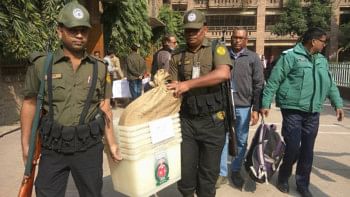Regional Governance Matters

According to an estimate by the UNHCR, about 25,000 people have been taken by boats from January to March 2015 by human traffickers. International media also covered the death of around 400 people in Indonesia, Malaysia and Thailand while the traffickers abandoned them on the sea. The discovery of mass graves in Malaysia and Thailand illustrates this saga of cruelty and exploitation of the refugees.
The Rohingyas are a Muslim minority in Myanmar's eastern Rakhine state, who are culturally discriminated, economically exploited, and politically sidelined by a government that is influenced by the Buddhist majority. Thus, extreme intolerance for the Rohingyas has been mainstreamed in Myanmar, with even the so-called civil society activists considering them as intruders who must be deported to Bangladesh. Bangladesh is now home to 32,000 registered Rohingya refugees, sheltered in two camps in the south-eastern district of Cox's Bazar, whereas thousands are living outside the camps, mixed up with the localities, living in temporary houses, locally known as Taal. According to UNHCR, more than 800,000 individuals in Rakhine State lack citizenship, in addition to other groups potentially at risk in other parts of Myanmar.
Against this backdrop, the question arises as to how this humanitarian crisis can be solved. The crisis cannot be allowed to continue for decades. International agencies including the UN requested neighbouring countries to host the floating people on a humanitarian ground. Some countries responded to the request but the crisis continues. Receiving more and more floating refugees cannot be a permanent solution. These people must have their right to a secure life and to live peacefully in their homeland.
For a sustainable solution, international agencies including the UN must take serious actions. Alongside the UN, regional associations like ASEAN and SAARC should be held responsible as they have been directly affected by the crisis. Therefore, the member states of these associations should have the political will and interest to resolve the crisis. There requires a combined political will and coordination between SAARC and ASEAN for a comprehensive settlement that is in the mutual interest of both sub-regions of Asia. UNHCR can initiate and mediate in the process, because despite the existence of these two inter-governmental institutions, no joint solution has been worked out. The recent Bangkok conference was a crucial step in the right direction that initiated a dialogue between the South and Southeast Asian states and it was the first time that the participating states exchanged their views in a comprehensive manner. Moreover, the USA, Australia and Japan vowed financial assistance for basic needs of the refugees as well as humanitarian aid for the Rohingyas in Myanmar and Bangladesh. But a matter of concern is that the Bangkok conference failed to think of any significant long term strategy to deal with the crisis.
Besides, there must be a comprehensive regional policy to tackle the crisis. The majority of the Asian states rejected the International Law on Refugees, established under the 1951 Convention relating to the Status of Refugees and the 1967 Protocol, claiming it to be irrelevant to the Asian refugee experiences. But it is high time for the Asian countries to ratify the convention. Moreover, whilst Asian countries have rejected the international conventions, majority of Asian states including Myanmar and Bangladesh are signatories to the Bangkok Principles on the Status and Treatment of Refugees adopted in 1966 by the Asian-African Legal Consultative Committee (AALCC). But there are some limitations of the Bangkok Principles, including limiting the rights of refugees, in the name of the security of the states, which puts the onus upon the state to decide whether or not the principles are applied. In addition, the Bangkok Principles are not regularly monitored, thus there is no mechanism to enforce or convince the states to follow the provisions. A joint regional intervention by SAARC and ASEAN for a comprehensive settlement of the crisis is, thus, a crucial need at the moment.
The writer is a Research Associate/Lecturer at the BRAC Institute of Governance and Development, BRAC University.


 For all latest news, follow The Daily Star's Google News channel.
For all latest news, follow The Daily Star's Google News channel. 



Comments